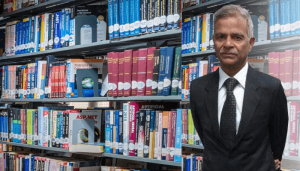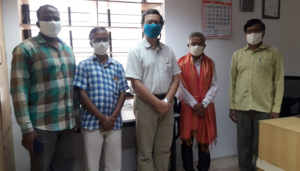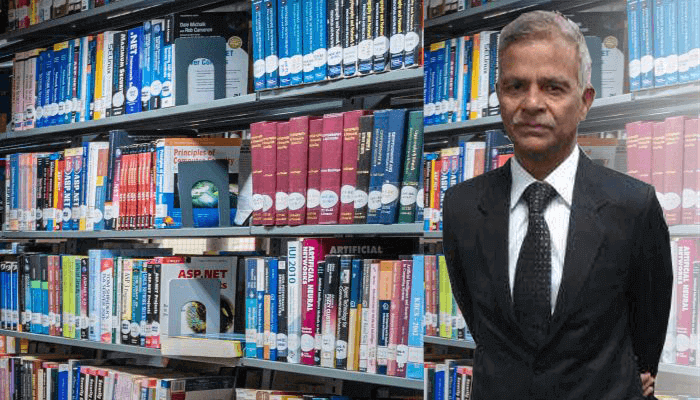It is said that when valuable, long-time employees exit an organisation, they walk away with a wealth of information and experience, often making it very hard for their younger successors to fill in their shoes. Last month, when IIITH’s first ever librarian Prabhakar Sharma transitioned into retirement, faculty, staff and students alike bid him a fond virtual farewell amid mixed feelings. Here’s a snapshot celebrating Sharma’s eventful journey at IIITH.
A midlife career change doesn’t raise eyebrows anymore. But we’re talking late 1990s and when the person in question is the placid institute librarian, Prabhakar Sharma, the story begs to be told. And like most interesting stories on campus, this too goes back to the institute’s inception.
Everything Before Them, Nothing Before Them
”In 1998, we were given a slightly impossible kind of a task – that of setting up the International Institute of Information Technology as an autonomous university by the then AP government. We had the option of doing it in the coming year but by deciding to do it the same year, we thrust it upon ourselves! So it put a lot of pressure on us. However, having the first 5 individuals along with us gave us the strength to actually attempt something like this. And among them, Prabhakar Sharmaji was there,” recounts Mr. Ajay Sawhney, Secretary to Govt of India, Ministry of Electronics and Information Technology (MEITy) nostalgically. The initial 5 members who include Satyanarayana, Ramana, Sastry, Bhaskar Prasad and Prabhakar Sharma are famously referred to as the “pillars” of the institute and worked together at the then AP State Non-Resident Indian Investment Corporation. They were deputed by the state govt agency to assist Mr Sawhney in the setting up of IIITH. Each of them had to suddenly fill different kinds of roles and responsibilities from what they were accustomed to. “When it came to the library function, I just requested Sharma ji to please start looking after this,” says Mr. Sawhney of how Sharma, then Assistant Manager, Accounts came to head the functioning of the institute’s Library.
Not one to accept and slide into a new role with mediocrity, 38-year-old Sharma went on to pursue not just a Bachelor’s in Library Science but a Master’s as well. “I still remember the words Sri Sawhney sir spoke to me and the plans on development of the library,” he says. Acknowledging Sharma’s voluntary efforts at upskilling and quietly improving his competencies, Mr. Sawhney remarks, “Someone actually could have gone on without making that kind of extraordinary effort in mastering the subject. He went through at that age a completely new makeover for a set of completely new academic qualifications, and a completely new set of professional competencies with the idea that ‘whatever I do, I have to be in command, I have to do it with a grip on the subject’.”
Progressive Expansion
That quiet determination and a sense of ownership led Sharma to gradually build up the library to what it is today. Housed initially in what is now the Saranga Hall, the institute’s library had a very modest start with the first procurement of 175 books on 22nd September 1998. It was a casual remark by a candidate attending a faculty interview that spurred Sharma to champion the cause of a wider collection of books and to project the library as one that meant business. “A part of my job then was to take visitors and faculty candidates on a campus tour. When I took this particular person to the library, he later remarked that his personal collection was bigger than that!”, recalls Prof. Vishal Garg with a laugh. At the time, with only 2 or 3 batches of students on campus, the small library size fit the institute’s requirements. Nevertheless Sharma took it upon himself to transform the meagre stature of the library recognizing that it was essential to attract good faculty.
“Initially the library had only text books for year 1. Slowly and steadily, more and more books were added including non-technical books, such as those on Literature, General Knowledge and Encyclopedia,” says Soujanya Lanka, alumnus of the first batch. From its very inception, the library timings have remain unchanged – 10am until midnight. However with the staff leaving for home by 5pm in the early days, it was the students who pitched in by working in shifts from 6pm onwards. “Just as we saw the institute grow, we also witnessed the library grow, all under the nurturing hands of Sharma sir. We worked as library assistants – to cover non-office hours reporting to Sharma sir and following his instructions in supervising the library. Working under his guidance taught us responsibility and ownership,” she avers. Sharma on his part fondly recalls the first batch students along with their roll numbers (!), Satyanarayana, Vivek Mandava, Chandrashekar, Uday Kumar, Roopa Krishnan, Soujanya, Durga, Lalitha and Subarna Sadukhan, and thanks them for their role in the library’s foundation.
Conservation and Frugality
A virtue that straddles economy and simplicity without being miserly is frugality. Something Prabhakar Sharma knows too well. “The frugal manner in which the resources have been used to build a strong library system, I think that itself is a wonderful thing,” says Mr. Sawhney adding that in many institutions one is likely to find a massive amount of resource consumption in the absence of its commensurate and effective utilisation. “But in the case of IIIT, it has been a good, frugal and effective utilisation of resources”. Prof. Pradeep Ramancharla, Registrar, IIITH agrees by narrating an incident that showcased how Sharma walks the talk of waste management. “It was during the National Assessment and Accreditation Council (NAAC) visit.. When the team went to the library and wanted to check files, he showed them a DiY file which held the necessary documentation. They asked him why he was using a file fashioned out of old posters and other publicity material, and in jest enquired if the institute had less than adequate funds to spare! And he replied very simply saying that although the institute could spend money, he was just saving resources! The team walked away impressed by his efforts and dedication”. The same trait was revealed whenever books needed to be ordered. “I used to tell him that it (ordering through the traditional route) might take some time, so I can instead order the books online. But he would not let me do so, insisting that as an institution we can get better discounts. And he would ensure an express delivery was made too. He was interested in saving money for the institute at every level,” says Prof. Jayanthi Sivaswamy, Dean (Academics) terming it one of his assets. “And an asset of all the members of the early team running the institute”, she adds.

A simple life is often equated with a traditional one. However in Sharma’s case, it should not be misconstrued as one that shied away from technology. On the contrary, Prof. Garg recalls that it was Sharma who first suggested digitising the process of issual of books in early 2000. “Of course, we didn’t have that kind of funds to buy big software. We bought a barcode reader, printed the barcode labels, enlisted students to affix the labels and even pitch in to create software for issuing the books,” he says. The task was gargantuan involving several students over several weeks. “It was the first attempt at digitising the library. So he had a vision in his mind of how to modernise the library and keep it functional as well as attractive at the same time,” says Prof. Garg. In fact when the Universal Digital Library project was accepted by the institute, it was Sharma again who was one of the significant contributors. “He chipped in tremendously to help us organize the operations as well,” says Mr. Sawhney.
Service With A Smile
Think Sharma and immediately an unruffled, smiling countenance comes to mind. But beneath that unflappable exterior lies a keen mind with a great eye for detail. “Knowing what people are interested in and then helping them in the manner that they want – this is a fantastic service that he provided and with such dedication towards the institution,” says Prof. Vasudeva Varma illustrating Sharma’s quality by mentioning how he used to regularly reserve tickets knowing well the professor’s interest in attending book exhibitions. Always open to ideas, he has been instrumental in the uptake of many suggestions – all for the improvement of library operations. “I once told him that it’s difficult to keep track of the new books coming into the library, and maybe a monthly email listing all the new acquisitions would help. He thought it a good idea and immediately started doing that. So he is a person who is quietly efficient, open (to ideas), and always looking after the interest of the institute”, says Prof. Sivaswamy. Of the quiet efficiency and competence Sharma has shown, Prof. Aniket Alam concurs,”As chair of the Library Committee, I rarely have any work to do because almost everything has been taken care of. I just have to sign everything that is ready for approval.” Sharma never failed to deliver. Whether it was a routine procurement for courses or a sizeable order at short notice, such as those for workshops, the books would always be there. And at competitive prices too. For many of the faculty members who joined the institute as newcomers themselves, he was there to welcome them onboard and give sage advice on how to go about things. Thanks to this quality, most of his colleagues refer to him as an “elder brother”, ever-ready to lend a ear or a shoulder to lean on.

Ties That Last
Prof. Narendra Ahuja, currently with the University of Illinois sums it up well when he quotes Rabindranath Tagore in response to Prabhakar Sharma’s relationship with the institute,”I slept and dreamt that life was joy. I awoke and saw that life was service. I acted and behold! Service was joy.” Terming this serendipitous association with IIITH as “God’s gift” itself, Prabhakar Sharma thanks not just the early founders, initial staffers, faculty but also students – past and present – for being a part of his journey. “I don’t have words to express all your help rendered,” he says. For those tearing up a wee bit, Prof. P J Narayanan points to the banyan tree that was adopted as the institute’s logo many years ago, saying, “The idea is to have secondary roots which will take over and make the institution even stronger”. Sharma may have retired as the librarian of the institute, but his tryst with IIITH continues. This time as a member of the Indic Wikipedia project where he has begun to contribute to the ongoing efforts in enhancing the Telugu Wikipedia – quietly and efficiently, just like we all know him.



Excellent news . Thanks and regards
Tapabrata Mondal says:Thanks a lot for this article. IIIT-H library is a wonderful memory for me. And thanks Prabhakar Sharma garu to make it that way.
On a side note, I am sure many of the ex-students like my self would like to contribute books to the institute library. If the institute can device an appropriate way to do so I think it will be much better
Sandeep Mellacheruvu says: